
Entertainment Anime & Manga Music

5 Things You May Not Know About Evangelion’s ‘A Cruel Angel’s Thesis’
Impress your friends at your next karaoke session with these little-known facts about the iconic anime song
August 2, 2024
“A Cruel Angel’s Thesis” might just be the most popular anime song of all time. In both Japanese and Western surveys, the opening theme from Hideaki Anno’s Neon Genesis Evangelion performed by Yoko Takahashi is often ranked at the very top by anime fans and karaoke goers. Even people who aren’t really into Japanese animated shows may have picked up the song’s famous opening lyrics, Zankoku na tenshi no you ni … (“Like a cruel angel …”) through pop culture osmosis. Yet for all of the song’s popularity, there are still some things about it that you may not know, like how …
1. Yoko Takahashi Still Practices the Song Daily
Neon Genesis Evangelion premiered nearly 30 years ago in 1995. People can change a lot in that time, especially singers. Their voices may not be what they used to be or they may not have the same range or lung capacity, but it’s OK because nobody expects them to sing exactly like they did three decades ago.
Except for Yoko Takahashi. She expects herself to perform “A Cruel Angel’s Thesis” during live performances just like she did in 1995 to transport the fans back in time to when they first encountered the show that most likely got them into anime. It’s why in past interviews, the singer has admitted to still practicing the song for up to two hours a day, focusing especially on the a cappella intro, which she finds particularly challenging.
2. The Song’s Title Was Inspired by an Incredibly Dark Manga
In interviews, the song’s lyricist, Neko Oikawa, claimed that the title “A Cruel Angel’s Thesis” was a nod to the comic book A Cruel God Reigns ( Zankoku na Kami ga Shihai Suru ). Created in 1992 by Moto Hagio, the manga is set in the US and tells the story of 15-year-old Jeremy who tries to murder his sexually abusive stepfather but ends up killing both his stepfather and his own mother.
The guilt eventually drives Jeremy into using drugs, which he affords by prostituting himself. Thankfully, none of that made its way into the final song, which, according to Oikawa, was inspired by the concept of “motherhood.”
3. Hideaki Anno Originally Wanted To Use Music From a Russian Opera for the Opening
There is a lot of symbolic imagery in Neon Genesis Evangelion, which fans of the show have analyzed again and again over the years. Hideaki Anno probably should have told them sooner not to waste their time. A lot of the visuals and plot points in Evangelion are, apparently, there simply because they seemed cool to him . Though in later interviews , Anno talked about finally embracing the complexities that fans saw in his creation, his approach to the original anime series was, basically, “No plans; just vibes.”
That’s possibly why, before contracting out the opening theme, he wanted to use something different and experimental to start off the show. His first choice was “Polovtsian Dances” from Act 2 of Alexander Borodin’s opera Prince Igor , the same song that opened the 2014 Winter Olympics in Sochi. The idea was ultimately shot down by the studio.
4. The Lyrics Were Slapped Together at the Last Minute
Neko Oikawa wasn’t closely involved with the making of Neon Genesis Evangelion. Her entire introduction to the project was a 30-minute meeting (without the music director, Hidetoshi Sato) and a screening of the first two episodes of the anime on fast-forward. After that, she was told to basically write whatever she wanted, as long as it felt “philosophical.” The writer admits it took her about two hours to complete the assignment.
5. There Are a Few Tricks to Singing the Song Perfectly
Yoko Takahashi was asked to sing the opening’s a cappella intro “in a child’s voice” or “like a teenager” (despite being 30 at the time). This, combined with some of Neko Oikawa’s difficult lyrics and the song’s tempo, provided a challenge to Takahashi, which she has learned to overcome over the decades. She then took all that she’s learned and put it into a 2021 instruction book of vocal exercises specifically for singing “A Cruel Angel’s Thesis” and “Soul’s Refrain” — the theme from Evangelion: Death and Rebirth — perfectly. She recommends that fans of the song first “practice at a slow tempo … Just slow down at first and pay attention to the melody of the a cappella.”
However, the most important piece of advice that Takahashi has for fans is to not get discouraged. The singer herself reportedly still feels nervous when performing the intro to Evangelion because it really is a difficult song. But, as she says , the sense of accomplishment you get when you get through the whole thing is more than worth the effort.
Related Posts
- How Kagura Dance Influenced the Story of Demon Slayer
- Iwao Takamoto – The Japanese Artist Who Designed Your Childhood
- New Demon Slayer Villain Offers Valuable Lessons About Japanese Culture
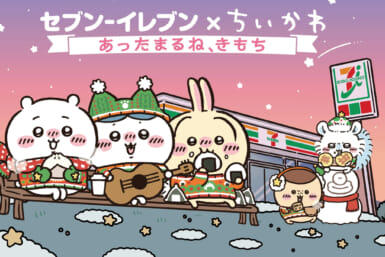
Chiikawa Teams Up With 7-Eleven in Cute Winter Collaboration
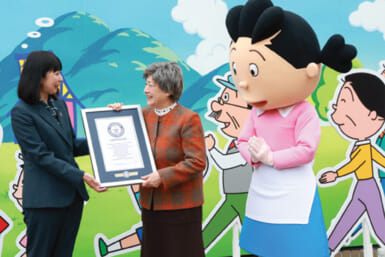
Sazae-san Breaks Two Guinness World Records
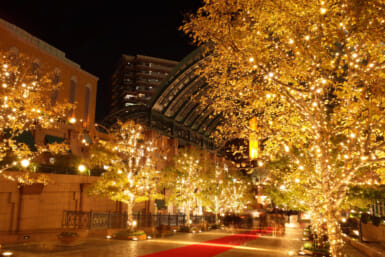
Your December 2024 Horoscope
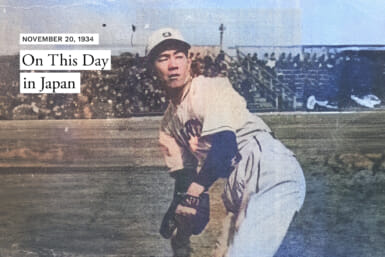

Eiji Sawamura Outshines Babe Ruth | On This Day in Japan

Discover the Cultural and Culinary Treasures of Shuzenji and Toi

Get a True Taste of Tokyo: An Urban Farm-to-Table Experience
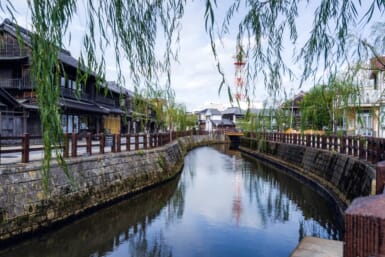
What To Do in Sawara, Chiba: A Charming, Beautifully Preserved Riverside Town
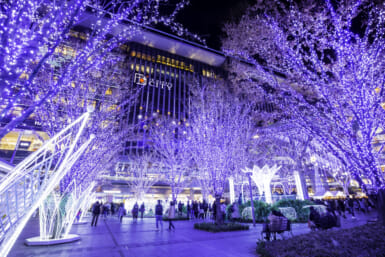
What To Do in Fukuoka in Winter: A Cozy, Romantic Seaside Getaway
Yoko Takahashi
Yōko Takahashi (高橋 洋子 Takahashi Yōko, born on 28 August 1966) is a Japanese singer (whose vocals are very easily recognizable) from Tokyo, perhaps best known for performing A Cruel Angel's Thesis (残酷な天使のテーゼ Zankoku na Tenshi no Tēze), the opening theme song of the anime series Neon Genesis Evangelion . She also performs the closing theme, an "acid bossa" version of "Fly Me to the Moon" and Tamashii no Rufuran (魂のルフラン Tamashii no Rufuran, Refrain of Soul), the closing theme of Evangelion: Death and Rebirth . She also recently performed "Metamorphose," the opening theme to studio Gainax's 20th anniversary series, This Ugly Yet Beautiful World, the ending theme Yoake Umarerekuru Shōjo (夜明け生まれ来る少女 The Girl who was Born at Dawn) for the anime Shakugan no Shana (灼眼のシャナ Blazing-Eyed Shana) and the opening theme Aoki Flamme for Pumpkin Scissors (パンプキン・シザーズ Panpukin Shizāzu) She is also Arimi Matsuno's sister-in-law.
- 1 Songs in Evangelion
- 2 Singles and Albums
- 3 External Links
- 4 References
Songs in Evangelion [ ]
- " Zankoku na Tenshi no These " (Original, 10th Anniversary, MATSURI SPIRIT Versions).
- " Tamashii no Rufuran " (Soul's Refrain), the ending song for Rebirth (Original and 10th Anniversary Versions).
- " Yokan " (Premonition), the ending song for Girlfriend of Steel .
- " Mugen Houyou " (Eternal Embrace), the ending song for Girlfriend of Steel 2nd .
- " Shiawase wa Tsumi no Nioi " (Happiness is the Smell of Sin), the opening song for Ayanami Raising Project (Dreamcast and PC versions only).
- A few versions of " Fly Me to the Moon " used in the series.
- " Kokoro yo Genshi ni Modore " (Return to Primitive Heart)
- " Tsuki no Meikyuu " (Moon Labyrinth), not used in the series or games.
- " Final Call ", theme song of the Neon Genesis Evangelion ~Roar to the Future~ pachinko machine.
- " Crime and Punishment - Those who are unwilling to pray ", promotional song for the S.J.H.U. PROJECT Shin Universe Robo .
Singles and Albums [ ]
- Zankoku na Tenshi no Thesis / FLY ME TO THE MOON (1995)
- Zankoku na Tenshi no These (Single) (1995)
- Tamashii no Rufuran/Kokoro yo Genshi ni Modore (single) (1997)
- Refrain, The Songs Were Inspired by Evangelion (1997)
- Zankoku na Tenshi no These/FLY ME TO THE MOON (2003 single) (2003)
- Neon Genesis Evangelion Decade (2005)
- Tamashii no Rufuran/-THANATOS-IF I CAN'T BE YOURS- (single) (2006)
- Zankoku na Tenshi no These 2009 VERSION (2009)
- Doukoku e no Monorogu (Single) (2010)
- Shibashi Sora ni Inorite (single) (2013)
- Welcome to the stage! (single) (2014)
- Zankoku na Tenshi no These/Tamashii no Rufuran (single) (2018)
- EVANGELION EXTREME (2019)
- EVANGELION FINALLY (2020)
- Nyankoku na Nyanko no These (2021)
- Shiro SAGISU what if? Yoko TAKAHASHI ver. (2021)
- Final Call (single) (2021)
- Teardrops of hope (single) (2022)
- EVANGELION ETERNALLY (2023)
External Links [ ]
References [ ].
- All songs before 2005 by Takahashi's songs, minus any versions she sang of Fly Me to the Moon, can be found on the Neon Genesis Evangelion Decade album.
- 2 Rei Ayanami
- 3 Kaworu Nagisa
A Cruel Angel's Thesis
A Cruel Angel's Thesis is the opening theme song for the series Neon Genesis Evangelion , composed by Hidetoshi Sato and sung by Yoko Takahashi . The lyrics are by Neko Oikawa while the arrangement is by Toshiyuki Omori. The song also has the distinction of taking first place in the JASRAC Awards. [1]
This song was written with relatively limited involvement from Hideaki Anno and the production staff, being handled by producer Toshimichi Otsuki . [2] Anno originally wanted to use an excerpt from Borodin's Polovtsian Dances in the opening, but the producers did not approve of this and instead decided to use a J-Pop song, which eventually resulted in the creation of this song by Neko Oikawa.
Oikawa apparently had very little knowledge of the show, which was under production at the time with the episodes not having been colored. According to tweets and interviews, Oikawa went through a proposal of the show (possibly Neon Genesis Evangelion Proposal ) and watched two unfinished episodes on fast-forward, only serving to broadly "fit" the anime after the fact [3] [4] The writing process for Episode 01 took as long as six months, [5] and the opening sequence was not yet finished. [6] [7] The original song included a male chorus, which was cut at director Hideaki Anno's request in order to "emphasize maternal affection". [8]
Oikawa states that she took inspiration for the title from the manga A Cruel God Reigns . [9] Among other statements, Oikawa said the lyrics "become a legend" were originally "become a weapon" and that she decided to make the song about the perspective of a mother when her child "leaves the nest." [10] Singer Yoko Takahashi was also brought in relatively haphazardly and had no knowledge of the series, and would only see the opening featuring her voice when it aired on TV. [11] She had also first met Anno on the day of recording. [12]
Original Japanese Lyrics: Neko Oikawa
Translation Notes
1 This was translated by Takayama Miyuki and these are the translator's notes:
- young boy, become the legend! : The word "shinwa" actually means "myth" ("legend" would be "densetsu"), but I think it sounds better as "legend."
- with surging, hot pathos : "Atsui" (hot) can also mean "intense, passionate." "Pathos" is "the quality or power in life or art of evoking a feeling of pity or compassion; pity; suffering; sorrow."
- Embracing this sky [universe] and shining : "Sora" (sky) is the reading given for the kanji for "uchuu" (universe).
- has any meaning : The kanji used for the "a" in "aeta" is not the normal kanji used in "au" (to meet). It's the first kanji in "ouse" (encounter, tryst) and has more of a connotation of meeting by fate or being brought together by fate, not just meeting. (Interestingly, a dictionary I have gives the meaning of "au," when written with this kanji, as "to meet (with drama or pathos)")
- for learning freedom : The "watashi wa sou" is probably "watashi wa sou omou." And "bible" in this case isn't referring to *the* Bible. "Bible" can also mean "guide book, how-to book, a book valued for its use as a reference," like in "a handyman's bible," or "a bird-watcher's bible."
2 This is the translation found on the U.S. release of Evangelion by ADV.
3 The instrumental section contains chanted non-Japanese lyrics in Yoko Takahashi 's version and a few others, while other versions of the song have a purely instrumental section. The January 1996 issue of Newtype magazine transcribed Takahashi's lyrics in this section as "Fariya. Seta(or sepa) messo. Fariya. Tuse." which they speculate is from the fictional language of the Dead Sea Scrolls. Alternatively, an EvaGeeks forum discussion suggests that the lyrics may be "Faria? Será mesmo? Faria? Eu sei!" which is in the Portuguese language. Since the word "Faria" is usually used in a similar way as the English word "would", those lines could be interpreted as someone doubting something or someone else. There has never been any official information on the actual lyrics or their meaning, if any.
- ↑ http://www.animenewsnetwork.com/news/2011-05-25/songs-from-evangelion-other-anime-win-jasrac-awards
- ↑ From the animania blog report on the March 28, 2005 NHK Anime Yawa talk show (translation by animania) - Otsuki said he allowed Anno to do whatever he wanted in the anime except for the theme music. Otsuki was particular about the theme and handled the music staff by himself, going as far as to claim that no anime staff, even Anno, met the music staff (apparently contradicted by Oikawa's statements). - Yuko Miyamura, BS AnimeYAWA
- ↑ “My manager got the job, we had a quick meeting lasting about 30 minutes, skim-read the proposal and watched two episodes on fast-forward. And with that I was told ‘so, yeah, just write whatever you want!’, and finished the song [lyrics] in about two hours. Sorry to burst your bubble, guys!” http://soranews24.com/2015/01/08/a-cruel-angels-thesis-took-just-two-hours-to-write-says-evangelion-lyricist-neko-oikawa
- ↑ "It wasn't even colored. I wrote the song, and my job was done. I wrote it in about two hours." Anime News Network interview with Neko Oikawa
- ↑ 2nd JUNE interview
- ↑ Notenki Memoirs
- ↑ According to Hidenori Matsubara during the Animazement 2015 convention, "the song was created before they even got done with animation for the opening theme. Strangely enough, the song manage to go along with the opening animation."
- ↑ Refrain of Evangelion OST Booklet, 2003.
- ↑ https://web.archive.org/web/20160830224921/http://news.livedoor.com/article/detail/11939169
- ↑ https://www.sankei.com/west/news/161228/wst1612280011-n1.html
- ↑ Yoko Takahashi Performs Neon Genesis Evangelion Theme, “A Cruel Angel’s Thesis,” to Excited Crowd at Anime Expo 2015 in LA
- ↑ —When was your first meeting with Mr. Anno? "It was on the day of recording. As I said earlier, when I entered the studio before anyone else to get ready, even while I couldn't afford, a man dressed in black and wearing sandals suddenly appeared. I didn't know who it was, but I just said hi, and he was actually Mr. Anno (Hideaki). It was a shocking encounter (laughs)." - Yoko Takahashi: EVANGELION FINALLY (2020)
- Translations
- Theme Songs
- This page was last edited on 3 May 2024, at 12:11.
- Content is available under Creative Commons Attribution-Share Alike 3.0 Unported License unless otherwise noted.
- Privacy policy
- About EvaWiki
- Disclaimers
Navigation menu
Personal tools.
- View source
- View history
- Image Requests
- Flagged Pages
- Random page
- Recent changes
- What links here
- Related changes
- Special pages
- Printable version
- Permanent link
- Page information

COMMENTS
"The Cruel Angel's Thesis" (残酷な天使のテーゼ, Zankoku na Tenshi no Tēze), [1] also known as "A Cruel Angel's Thesis", [a] is a J-pop song performed by Japanese singer Yoko Takahashi. Toshiyuki Ōmori and Hidetoshi Satō composed the song, while Neko Oikawa wrote the lyrics.
In 1995, she released the single "A Cruel Angel's Thesis" (残酷な天使のテーゼ, Zankoku na Tenshi no Tēze), which was used as the opening song in the anime series Neon Genesis Evangelion.
"A Cruel Angel's Thesis," Evangelion's opening theme, might just be the most popular anime song of all time. But how much do you know about the singer behind...
Provided to YouTube by Masterworks The Cruel Angel's Thesis (Director's Edit Version) · Yoko Takahashi NEON GENESIS EVANGELION (Original Series Soundtrack) ℗ 2019 Exclusively Licensed by...
"Zankoku na Tenshi no These" (残酷な天使のテーゼ, Zankoku na Tenshi no Tēze?, "A Cruel Angel's Thesis") is the theme song of the popular anime TV series Neon Genesis Evangelion performed by Yoko Takahashi.
In interviews, the song’s lyricist, Neko Oikawa, claimed that the title “A Cruel Angel’s Thesis” was a nod to the comic book A Cruel God Reigns (Zankoku na Kami ga Shihai Suru).
Yōko Takahashi (高橋 洋子 Takahashi Yōko, born on 28 August 1966) is a Japanese singer (whose vocals are very easily recognizable) from Tokyo, perhaps best known for performing A Cruel Angel's Thesis (残酷な天使のテーゼ Zankoku na Tenshi no Tēze), the opening theme song of the anime series Neon Genesis Evangelion.
"The Cruel Angel's Thesis" (残酷な天使のテーゼ, Zankoku na Tenshi no Tēze), also known as " A Cruel Angel's Thesis ", is a J-pop song performed by Japanese singer Yoko Takahashi. Toshiyuki Ōmori and Hidetoshi Satō composed the song, while Neko Oikawa wrote the lyrics.
A Cruel Angel's Thesis is the opening theme song for the series Neon Genesis Evangelion, composed by Hidetoshi Sato and sung by Yoko Takahashi. The lyrics are by Neko Oikawa while the arrangement is by Toshiyuki Omori. The song also has the distinction of taking first place in the JASRAC Awards.
高橋洋子 (Yoko Takahashi) - 残酷な天使のテーゼ (A Cruel Angel’s Thesis) (English Translation) Lyrics: Like a cruel angel / Young boy, become the legend! / A blue wind is now / Knocking at the door to your...